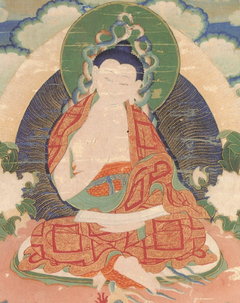In Praise of Gratifying Sentient Beings
In Praise of Gratifying Sentient Beings
by Ārya Nāgārjuna
In the language of India: Sattvārādhanastava
In the language of Tibet: sems can mgu bar bya ba’i bstod pa
In the English language: In Praise of Gratifying Sentient Beings
Homage to Mañjuśrī!
1. Respect for me is for sentient beings’ sake, or else it’s not respect.
Anyone who has not forsaken compassion is respectful toward me.
Those who forsake compassion and remain without it have fallen.
Only compassion can then lift them from their plight, nothing else.
2. Whoever works compassionately for beings’ welfare
Not only pleases me but also upholds the teachings.
Ethical discipline, learning, compassion, wisdom and clarity—
Whoever possesses these makes lasting offerings to the Sugata.
3. It is through benefitting beings that I gained accomplishment.
It is only for sentient beings’ sake that I perfectly maintain this kāya.
Whoever harbours harmful intentions towards sentient beings
Does not rely on me and will not discover the genuine meaning.
4. Even slight benefit to sentient beings constitutes an offering,
Because an offering is something that gratifies the mind.
Even the fanciest of gifts presented by one who bears animosity
Or one who does harm to others could not qualify as an offering.
5. My wives, my children, my wealth, and great dominion,
My flesh, my blood, my fat, my eyes, and even my bodies—
I have given them all away on account of my love for beings.
If you injure these beings then you do harm to me as well.
6. Thus, to benefit sentient beings is the best of offerings to me,
While to harm sentient beings is to cause me the utmost injury.
Since I and sentient beings experience parallel joys and sorrows,
How could one who harms sentient beings be a disciple of mine?
7. In dependence on sentient beings, I delighted buddhas and cultivated virtue.
Through consistently benefitting many sentient beings, I won the pāramitās.
With the intention of striving for sentient beings’ welfare, I overpowered Māra.
It was thus through acting in such ways for sentient beings that I became a Buddha.
8. If there were no living beings like those whom we cherish from one life to the next,
What would be our focus as a means to accomplish loving kindness and compassion?
Who would be the objects of equanimity and joy? The basis for emancipation and the rest?
For whom would the compassionate make lasting efforts to cultivate endurance?
9. I have given away many sentient beings, including elephants, as gifts,
And through my gifts have attracted beings who made suitable vessels.
Seeing the varied plights of beings has made my compassion increase.
If not to protect sentient beings, then why would I have done all this?
10. If there were no beings there would be no saṃsāra in which to undergo lifetimes
Of untold harm based on a mass of unbearable afflictions, so why seek to attain benefit?
If I, whose nature as a Sugata is the greatest of wonders, an adornment to cyclic existence,
Were lacking in love for sentient beings, then for whose sake did I gain accomplishment?
11. As long as my teachings remain ablaze, affording benefit to sentient beings,
For that long you too, who wish the supreme benefit for others, should abide.
You who have heard of my good deeds should tirelessly apply what you’ve learned
For sentient beings’ sake, and, undaunted, extract the essence of this existence.
This concludes In Praise of Gratifying Sentient Beings, a teaching that the Blessed One imparted to the Sixteen Great Śrāvakas, as recorded in the scripture called Saltwater River from the Bodhisattva Piṭaka, summarised in verse by the master Nāgārjuna.
Translated [into Tibetan] and edited by the great Indian preceptor Dīpaṃkara Śrījñāna and the lotsāwa-monk Tsultrim Gyalwa.
| Translated by Khenpo Yeshe Gyaltsen, Tenzin Yeshe Jamchen (Sean Price) and Adam Pearcey, 2023. With appreciation and thanks to Ven. Thubten Drolma.
Bibliography
Tibetan Editions
Nāgārjuna (klu sgrub). "sems can mgu bar bya ba’i bstod pa." Toh 1125. sde dge bstan 'gyur. Vol. 1 (bstod tshogs, ka): folios 74b–75b
Ngag dbang dpal ldan. "sems can mgu bar bya ba'i tshigs su bcad pa mchan dang bcas pa." Bod kyi brdaʼi bye brag gsal bar byed pa ngag gi sgron ma sogs. (BDRC W1NLM4879) 6 folios. http://purl.bdrc.io/resource/MW1NLM4879_O1NLM4879_011
Secondary Sources
Geshe Tsulga (Tsultrim Chöphel), Thubten Damchoe, and Yeshe Chodron, ″Praise To Satisfying Sentient Beings″ In Arya Nagarjuna’s Praise to Satisfying Sentient Beings [and] A Commentary on the Awakening Mind. Medford, MA: Kurukulla Center for Tibetan Buddhist Studies, 2015. pp. 25-29
Hartmann, Jens-Uwe. "Der Sattvārādhanastava und das Kṣāranadīsūtra." In B. Kellner, H. Krasser, H. Lasic, M.T. Much, H. Tauscher (eds.), Pramāṇakīrtiḥ. Papers dedicated to Ernst Steinkellner on the occasion of his 70th birthday. Part 1. (Wiener Studien zur Tibetologie und Buddhismuskunde 70.1) Wien 2007, pp. 247–257.
Version: 1.0-20230406
